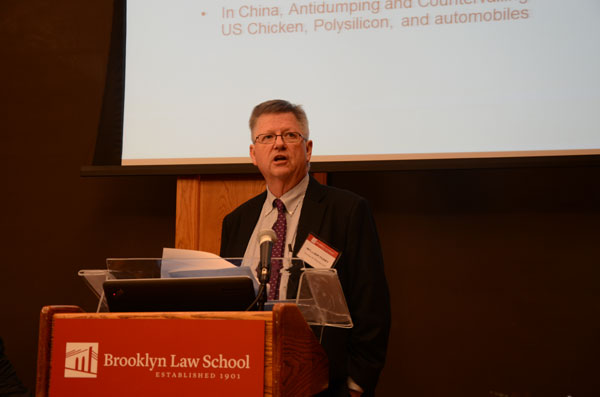China's market economy status 'political': attorney
Updated: 2015-01-23 11:29
By NIU YUE in New York(China Daily USA)
|
|||||||||||
 |
|
William Perry, partner of Dorsey & Whitney LLP, speak at Brooklyn Law School on Jan 21 in New York. Lu Huiquan / For China Daily |
China's market-economy status, which is vital in anti-dumping investigations, is more political than economic,according to an attorney who represents Chinese enterprises and American importers in anti-dumping cases in the United States.
"This is a political decision," William Perry, partner of Dorsey and Whitney LLP, said Wednesday during a seminar on China-US trade disputes at Brooklyn Law School. "Understand that. That's the reality."
Perry has been representing Chinese exporters and manufacturers in anti-dumping cases since 1991 and has worked with the International Trade Commission and the US Department of Commerce (DOC).
The comment comes at a time of heated debateon whether China will be automatically recognized as a market economy.
China agreed that other members of the World Trade Organization (WTO) could regard it as a "non-market economy" for 15 years from Dec 11, 2001, as a condition of joiningthe WTO in 2001.As the deadline of Dec 11, 2016, draws near, there have been disputes on whether China would be automatically recognized by other WTO members, based on different understandings of China's accession agreement.
China has been negotiating with other WTO members one by one to win market-economy status before 2016. Dozens of countries, including Russia, New Zealand, Australia and Singapore, have granted China that status.
Meanwhile, some of China's major trading partners, including the US and the European Union (EU),have not, saying that China has not met their criteria.
"Some of the bigger problems with China right now [are] the extensive industrial planning in China," said Christopher Cloutier, partner of King & Spalding LLP, which filed and prosecuted the first successful anti-subsidy case against China in 2007.
"There are some elements that are not very market-oriented, for example, preventing foreign ownership," he said, citing an industrial plan to develop China's iron and steel industry.
But Perry insisted the issue is more political, giving Russia and Ukraine as two examples. Russia and Ukraine won US recognition, respectively, in 2002, after the Afghan War, and in 2006 after the Orange Revolution.
Related Stories
US extends antidumping duties on China's lawn groomers 2015-01-13 10:24
US to maintain antidumping duty on China's steel nails 2013-12-12 10:42
China sets antidumping duties on US, Japan resorcinol 2013-03-22 17:24
Today's Top News
China offers Swiss $8b quota for yuan trading
Best team China in decade carries countrymen's hope
Russia says DPRK sent positive signal on Kim visit in May
Australia PM quashes rumours of unrest as 'nonsense'
China aims for stronger links with fragile Europe
China to instill national characteristics in think tanks
Shanghai govt releases report on stampede tragedy
Fake condoms, Viagra, seized and online network shut down
Hot Topics
Lunar probe , China growth forecasts, Emission rules get tougher, China seen through 'colored lens', International board,
Editor's Picks

|

|

|

|

|

|





